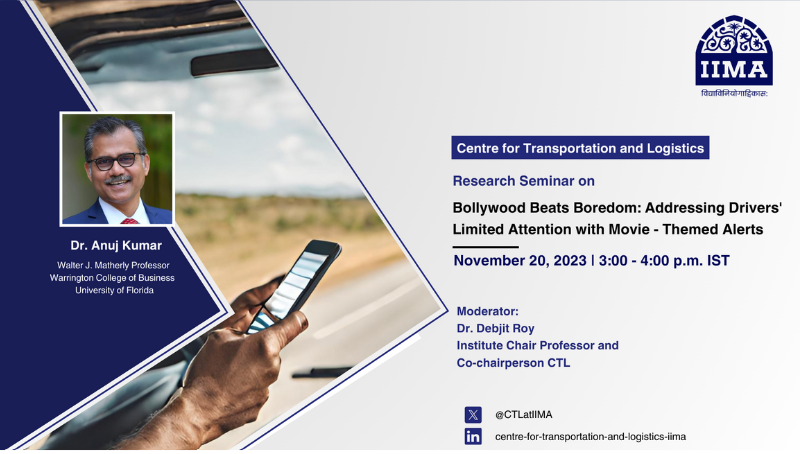
20/11/2023 - 20/11/2023

Abstract:
Well-designed and timely reminders can mitigate individuals’ limited attention by bringing the desirable activity (and its outcome) to the top of their minds. However, individuals may mentally switch off to such reminders if they are delivered repetitively in a monotonous fashion. Drawing from the opportunity cost theory, we identify boredom -- a hedonic motivational state -- as the underlying reason for this behavior. Creating multiple interesting variations of a reminder and randomly offering one of its versions can arouse individuals’ curiosity and direct their attention to the reminder. We test this intuition in an eight months long randomized field study on truck drivers using a safe driving app in India. We created multiple versions (new alerts) of each type of old audio alert based on the dialogues and songs of popular Bollywood movies. During the study, while the control drivers received the same old audio alert on all occasions, treated drivers received randomly drawn versions of the new alerts on different occasions. Our analysis reveals that treated drivers increased their trip distance (duration) on the app by 104% (76%), suggesting higher driver engagement with new alerts. We further examine the relative efficacy of offering new alerts versus monetary incentives on drivers’ engagement. Our results indicate a significantly higher effect of new alerts on drivers’ engagement than monetary incentives. The positive effect of new alerts remained consistent over the five months of treatment, suggesting it is not a temporary novelty effect. Finally, we found that drivers are less tolerant of the repetitive old alerts after experiencing the new alerts. Our research shows that besides reminders’ timeliness and core content, their delivery is equally important in eliciting desirable individual behavior.
About the Speaker:
Dr. Anuj Kumar is an Associate Professor and Matherly Professor of Information Systems at the Warrington College of Business, University of Florida. He holds a Ph.D. in Information Systems from Heinz School of Information Systems and Management, Carnegie Mellon University. He also holds a Bachelor’s degree in Mechanical Engineering and a Master’s degree in Thermal Engineering from the Indian Institute of Technology, India, and a Master’s degree in Management from the Indian Institute of Management, India. Professor Kumar's research focuses on understanding how information technology affects the behavior of organizations, individuals, and the interactions between them. His research has been published in top-tier journals like Management Science, Information Systems Research, Manufacturing & Service Operations Management, and Management Information Systems Quarterly.
